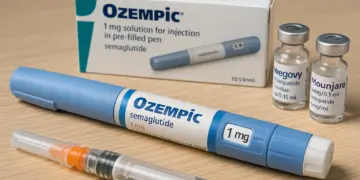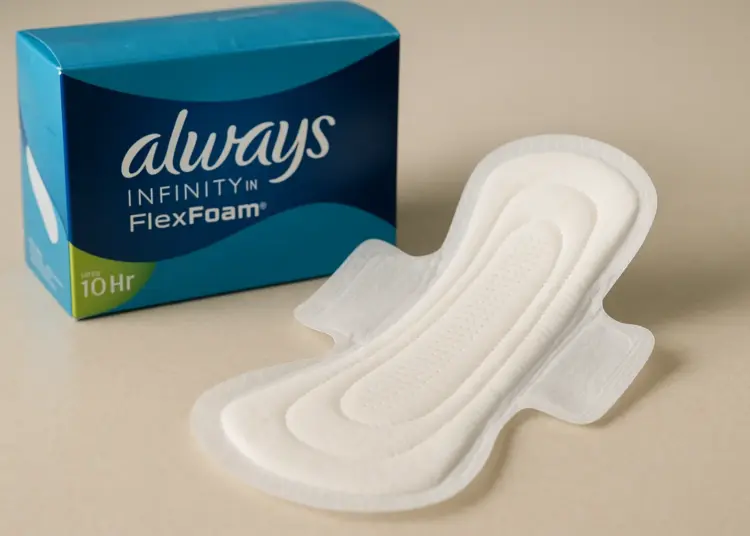Story Highlight
– Women report severe burns from Always sanitary pads.
– TikTok videos highlight adverse reactions to Flexfoam products.
– Always insists on safety as their top priority.
– Complaints include itching, rashes, and chemical burns.
– Huel faces controversy over lead content in protein powder.
Full Story
Concerns have arisen regarding the safety of Always sanitary products following numerous reports from women expressing distressing reactions to their use. A wave of videos recently surfaced on TikTok, garnering significant attention as individuals shared their experiences of painful chemical burns allegedly caused by the brand’s products, which are owned by Procter and Gamble.
In one particularly impactful post, user @ratqueen910, whose video has been viewed over 45,000 times, described experiencing “the worst chemical burns ever” in her groin area, which she explained had developed where the sanitary towel contacted her skin. Reflecting on the severity of her situation, she remarked, “When I looked at the burn with the flash on, it really looked like my skin was gooey!!! I was scared af.” Initially believing her discomfort to be merely chafing or a reaction to the Spandex in her underwear, she later connected with other women online who were experiencing similar issues.
“I realised that so many people have had problems the last few months with these pads,” she stated in her clip. She pointed out her long history of using Always products, noting, “I’ve used them since I was in like sixth grade,” and thus concluded that a recent change in their formula must have been responsible for her adverse reaction. The user expressed disbelief that her issue stemmed from anything other than the pads themselves, stating she had never previously suffered from sensitivity to scents or any infections.
Reacting to her video, a flurry of social media users left comments corroborating her experiences, with many revealing that they too had undergone negative reactions to Always’ Flexfoam sanitary pads. Accounts ranged from irritation and rashes to similar chemical burns. One commenter recounted, “The whole area that the pad touched gave me a chemical burn after only a few hours. It was the Flexfoam.” Another user echoed this sentiment, stating, “No seriously, I switched to Honey Pot and had been using these for a year. When I asked my coworker for a pad she gave me an Always pad…best believe I got a chemical burn.”
Many also recounted similar experiences over multiple cycles, indicating a pattern of adverse reactions linked specifically to Always products. “I use a different type and brand for the first half of my period and then switched to Always for the last two days, ending up with this burn issue for three months in a row,” one woman remarked. Reports of rashes and itching were also prevalent, with participants in the discussion expressing surprise during their own cycles.
In light of these alarming claims, an Always representative reaffirmed the brand’s commitment to consumer safety. “Our pads are used safely by millions of women every day around the world. Their safety is our top priority, and we carefully evaluate every component of our Always products to minimise the chances of skin irritation or allergic reactions,” the spokesperson stated. They further encouraged individuals with concerns to reach out through the company’s dedicated consumer care channels accessible via their website.
While specific geographical locations of the affected users remain unclear, always has received approval from the Skin Health Alliance, which indicates dermatological safety across Europe. The brand, like many others in the industry, conducts thorough testing of its products throughout various stages of production.
This controversy emerges shortly after another consumer health concern involving Huel, a protein supplement brand, which has faced scrutiny over alleged unsafe lead levels in its Black Edition protein powder. A report by Consumer Reports provided alarming findings, suggesting that a significant number of protein powders exceeded safe lead levels, with Huel’s product containing over 6 micrograms per serving, well above the recommended daily limit of 0.5 micrograms as advised by consumer watchdogs. Responding to these claims, Huel’s Marketing Director, William Patterson, characterised them as “unnecessary scaremongering,” asserting that the product remains compliant with relevant food safety guidelines.
As investigations into the safety of hygiene products and dietary supplements continue, trust in these brands is being closely scrutinised. Consumers are left to navigate these complex issues, often relying on online communities for shared experiences and information during their personal health journeys.






















If users are reporting burns and severe irritation from a sanitary product that should be safe for regular skin contact it is essential that these reports are taken seriously and investigated promptly. Manufacturers and regulators should review ingredient safety data and supply chain controls and conduct independent laboratory testing where needed. In the meantime consumers experiencing adverse reactions should stop using the product seek medical advice and report incidents to their local health authority or the national regulator so trends can be identified. Clear transparent communication from companies about investigations and any corrective actions is important to maintain public trust. Similar concerns about other consumer health products highlight the need for robust routine testing and rapid regulatory response when safety signals emerge.
If people are reporting burns and severe irritation from a personal care product that should be safe for daily use it needs a prompt and transparent investigation. Companies should cooperate with independent regulators and make test results public so consumers can make informed choices. In the meantime anyone experiencing strong reactions should stop using the product and seek medical advice and report the incident to the relevant safety authority.
If people are reporting burns and severe irritation from a personal care product it needs immediate independent investigation and clear communication from the manufacturer and regulators. Anyone suffering adverse effects should stop using the product and seek medical advice, and incidents must be reported to the appropriate safety body so regulators can assess risk, collect samples and test for contaminants or formulation issues. Retailers and employers should review stock and withdrawal processes to prevent further exposure while an investigation is carried out. Trust in health related brands depends on transparent testing, timely recalls when needed and visible regulatory action to protect consumers.